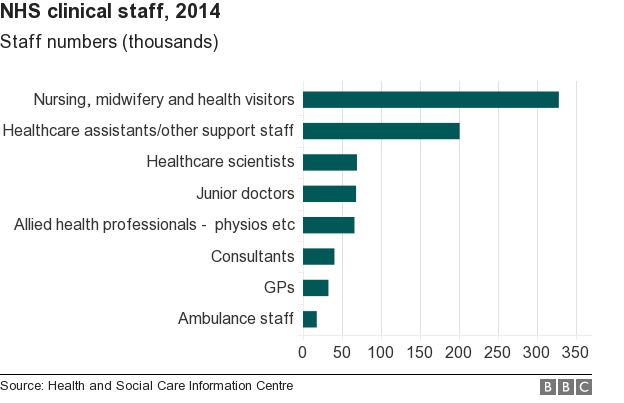The BBC reported in May 2016 that bad planning and cost-cutting have left the NHS in England short of vital front-line staff, MPs are warning.
The Public Accounts Committee said the shortfall in doctors, nurses and midwives could even get worse if ministers did not get a “better grip”.
The group also warned there had been “no coherent attempt” to work out the staffing needed for a seven-day NHS.
But the government defended its record, pointing to the extra money being invested in the NHS this Parliament.
By 2020, the NHS budget is expected to have risen by just over £8bn once inflation has been taken into account.
The cross-party group of MPs acknowledged this in its report, but cast doubt on how far that would stretch given that ministers are trying to increase the availability of staff and services at weekends.

The report looks at clinical staff – those who provide care, including doctors, nurses, midwives and ambulance crews.
These account for more than 800,000 jobs – two-thirds of the entire NHS workforce.
It said working out the exact shortfall was difficult, but said estimates made two years ago suggested the NHS was short by about 50,000.
The report was published as it emerged that emergency surgery at a Nottinghamshire hospital has been suspended because of a shortage of junior doctors.
Surgical patients at Bassetlaw Hospital are now being transferred to Doncaster Royal Infirmary – almost 20 miles away.
Managers at the hospital said there was a lack of overnight staff and the problem was affecting 10 to 14 patients a week. The BBC’s Nick Triggle considers the detail of the report by MPs
The MPs were scathing of the leadership provided by the government and national bodies, such as Health Education England, in recent years.
It said NHS trusts had been given conflicting messages – being urged to cut overheads to save money, while investing in staff in the wake of the Stafford Hospital scandal.
This has created a situation whereby the NHS had reduced the number of training posts available for core groups such as nursing, while struggling to retain staff, despite increases in demand for services.
The report said the high level of spending on agency staff seen in recent years was “largely the consequence” of this bad planning.
While NHS leaders have been quick to blame “rip-off” fees, prompting them to introduce a cap on how much can be charged, the report pointed out that most of the rise was a result of the NHS needing locum staff to fill gaps.
Committee chairman Labour’s Meg Hillier said there were “serious flaws” in the approach of government.
“Front-line staff are the lifeblood of the service yet the supply of these staff in England is not keeping pace with demand.
“This poor workforce planning means patients face the possibility of longer waiting times and a greater cost to the public purse.”
British Medical Association leader Dr Mark Porter said this is a “disastrous” situation.
And Royal College of Nursing general secretary Janet Davies added: “What we have seen so far is how short-term decisions and budget cuts lead to nothing but lowered standards of care which could so easily have been avoided.”
But a Department of Health spokesman said plans were in place to increase the number of staff in the NHS thanks to rises in spending.
“By 2020, we expect to have 11,420 more doctors working in the NHS, coupled with 10,000 nursing, midwife and allied health professional training places through our reforms. “
